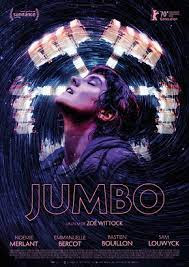Zoé Wittock calls this film a 'romantic fairy story', which it certainly is, and she was inspired to make it on learning that Erika Eiffel had married the Tour d'Eiffel: in fact she sought out Erika to visit her before making the film. Jeanne Tantois (Noémie Merlant in a brilliant performance) is a young woman living with her mother Marguerette (Emmanuelle Bercot), now in a single-parent relationship and who only with difficulty could be more different from her daughter: Marguerette is a non-too-bright bartmaid eager for sexual encounters she can come upon; Jeanne works in an amusement park (actually Plopsa Coo in Belgium), is very shy and sexually inexperienced, and quite possibly at some low level in the autistic spectrum, but then who isn't?
Wittock didn't choose the Tour Eiffel as it is too static, but tentatively Jeanne develops a relationship with the machine Move-It, which she renames Jumbo and which she rapidly falls in love with, reading signs from the machine that it is responding to her attentions. The park director Marc (Bastien Bouillon) is attracted to her but can't understand her. As she tends the park at night she gets to see Jumbo a great deal, and on one occasion has an orgasm: the oil from the machine is seen in the light of sexual fluid, and there's an almost surreal sequence in which she bathes in the oil.
If the main theme is objectophilia, the sub-plot is the intolerance of humans towards difference, of not accepting people and ridiculing them because they don't fit in with the norm: her mother thinks she's crazy; Marc (who on one occasion has indifferent sex with her but still lusts after her) is as insensitive as her mother: at the annual amusement park ceremony he presents Jeanne with an employee of the year award, and then says that Move-It is moving on because (falsely he claims) it's not attaracting enough people. On stage Jeanne attacks him.
Later, Marguerette's new boyfriend Hubert – who has previously remained in the background and not seemed to have much to say – berates Marc for his intolerance and tells him to leave Marguerette's property, only to turn to her, criticise her for her intolerance and inhumanity to Jeanne, and promptly leaves Marguerette. Yes, Marguerette has a lot of growing up to do very quickly, and almost the final scene shows her, Hubert and Jeanne standing underneath Jumbo, with Hubert and Marguerette (separately) playing the role of vicar, with Jeanne dressed in white with a bridal veil.
For a first feature this is a stunning movie, and let's be honest: it's an important one too.




No comments:
Post a Comment